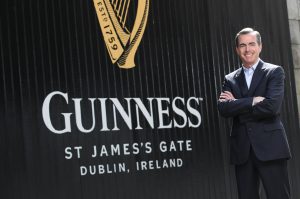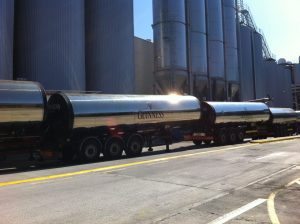Barry O’Sullivan – staying close to his customers

The data shows a broader appeal than ever for Guinness, says Barry O’Sullivan.
Word on the street has it that publicans feel happy with Diageo Ireland’s Managing Director since April last year Barry O’Sullivan.
As one Dublin publican put it, “He goes out to meet us at our place of work and doesn’t stay in an ivory tower in St James’s Gate”.
This approach reflects Barry O’Sullivan’s business philosophy.
“Any business needs to be close to its customers and needs to understand what their needs are and how to best serve them,” says Barry, “Ultimately we’ve set ourselves a clear ambition to emerge stronger together with our partners, colleagues in Diageo, customers and the communities in which we work.”
Barry joined Diageo from the Mars Group having worked with the company for the last 20 years. He’d been based in Australia with his wife and two daughters for the latter five years as Australia & New Zealand’s General Manager for Mars Petcare. But he’d also spent time as General Manager for Mars Chocolate based in Mexico and General Manager for the Middle East, Turkey and Africa at Mars Incorporated.
Major concern
Now, he enjoys trips to pubs which have highlighted that “A major concern for our customers is staffing and training so we’re doing everything we can and engaging in a lot of initiatives to address this – TU Dublin, for example, where we’ve created courses to develop skills and capabilities for the hospitality trade.
“Of course, we’ve had other activities going on to support the trade such as ‘Raising The Bar’, the €14 million fund to support publicans during Covid. We’ve almost emerged from one crisis but we’ve still a lot of challenges to deal with together.”
Not there yet
Undoubtedly, the on-trade has been on a journey through Covid but might feel deep in the woods still. But Barry believes that progress has been made.
“I think the majority of publicans would say they’ve made very strong progress since the recovery began but we’re definitely not there yet,” he points out, “We’ll be supporting on things such as the great outdoor spaces, for example.”
Over the next 12 months Diageo will also invite hospitality workers and publicans into Roe & Co to enjoy the distillery experience and learn more about the product and how it’s a great fit for cocktails.
“This is just a simple example of how we can help our customers develop, retain and engage their staff.”
Apart from staffing, rising costs represent a challenge we all face.
“It’s almost one and same thing” believes Barry, “for a lot of publicans staff is their biggest cost. But consistently what we hear is their biggest problem is around staffing.”
Central role of the pub
The experience of Covid over the last two years has underlined the importance of the pub and the central role it plays in Irish sociability.
“So, when it was taken away from us it left a huge void which we’re very grateful to have back,” he says.

“There’s been a renewed sense of the importance of the pub and how it can be an ‘unlock’ for great social occasions and experiences.”
“Over the last few years we’ve seen outlets that have invested in the quality of the experience they provide – and they’re seeing an exponential return for their investment and time.
“If you’re not looking to continually enhance the experience that you’re providing, even in really simple terms, then people may look elsewhere for that quality experience.”
And Diageo contributes to that ‘experience’ through innovations like Guinness 0.0%.
“People who wouldn’t have gone to the pub in the past or wouldn’t have been a regular might now consider going out for a midweek occasion and may also wish to have a non-alcoholic drink. Now we’re giving that person a reason to go to the pub. These are the ways that we’re helping to enhance the experience in the pub.”
Guinness broadening its appeal
Despite Covid Guinness has emerged stronger as a brand, he claims, “Market share is higher now than it was pre-pandemic across both on-trade and takehome channels according to the latest Nielsen and CGA share data.”
It aims to broaden its appeal to all Legal Drinking Age consumers and seems to be meeting with success in this endeavour too.
The data shows a broader appeal than ever for Guinness which is now appealing to all Legal Drinking Age consumers, he says, “We also looked at how many people are consuming a Guinness over a three-month period and these figures are greater than they were.”
Happily, too, production at St James’s Gate is back up to 2019 levels. Over the last few months the Irish, GB and US markets have all reopened at the same time so brewing is certainly up to pre-pandemic levels, he says, eyebrows indicating it to be most likely surpassing 2019 levels.
Indeed, St James’s Gate has just received planning permission to extend its on-site beer processing facility.
Ukrainian supplies
Naturally there will be a global impact from Russia’s actions in Ukraine which remains a significant source of many raw materials for the rest of the world.
Diageo Ireland is traditionally very strong in local businesses as it sources locally and brews here and is proud of being a local Irish business that relies on local sourcing for the making and selling of its products.
But it also has the benefit of being a global business where it’s able to tap into the expertise and knowledge that exists in the global Diageo business.
But in regard to Ukraine, Barry explains that, “Currently we’re focused on the humanitarian response and have pledged €2 million to be shared equally between Red Cross and CARE International to help humanitarian efforts in the region.”
But with inflation running at 7% and uncertainty dogging production costs, can the trade – and the consumer – avoid further price increases?
“Across the economy costs are rising for everybody,” he replies, “We can see that in the cost of weekly groceries, the fuel put into the car etc. It doesn’t feel like that pressure is going to ease any time soon.
“But it’s good to build up resilience in your business against some of the future cost pressures.
“For example, by going all-electric in transportation we can offset some of our fuel costs.”
Brewing & sustainability
Earlier this year Diageo Ireland announced that its ‘Quality’ fleet will switch to electric vehicles and it’s adding four electric Volvo trucks to its fleet this Summer which will be used in a pilot to deliver kegs in Dublin City.Here at home one of the main challenges Diageo has focused on is ‘sustainability’.

Earlier this year Diageo Ireland announced that its ‘Quality’ fleet will switch to electric vehicles and it’s adding four electric Volvo trucks to its fleet this Summer which will be used in a pilot to deliver kegs in Dublin City.
“We’ve committed ourselves to some very ambitious targets, what we call ‘Society 2030’ which includes a ‘grain to glass’ approach to sustainability,” he explains, “We’ve announced a number of pilots to examine how we can do this including regenerative agriculture which is an approach to farming that puts back more than it takes out.
“Earlier this year we announced that our ‘Quality’ fleet will switch to electric vehicles and we’re adding four electric Volvo trucks to our fleet this Summer which will be used in a pilot to deliver kegs in Dublin City.”
Today St James’s Gate is one of the most sustainable breweries in the world, committed to working towards a low-carbon future.
“Also there’s the redevelopment of the James’s Gate site which will see 12.6 acres transformed into the Guinness Quarter, an urban neighbourhood that will open up the historic Gates to the people of Dublin, maintaining brewing operations, obviously, but also utilising the vacant space here to bring to life something that we can be proud of as a community — and to have exciting spaces to live and work in in Dublin 8.”
But for now, given the challenges everyone is facing in the months ahead, Barry just wants to ensure that Diageo “stays close to our customers”.
Alongside this, Diageo Ireland intends maximising the potential of new products.
“We’re selling Guinness 0.0% as fast as we can make it, so that’s good,” he observes.









